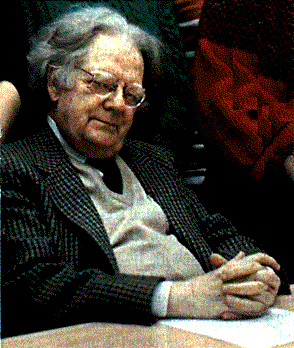
In Bob’s announcement yesterday on the posting in the Denham Library of Frye’s previously unpublished letters to his secretary Jane Welch, he includes this tidbit:
[The Critical Path] is the first book since the Anatomy of Criticism that I’ve actually written, i.e., that hasn’t been a series of public lectures. It’s also a very important book. I probably won’t live to see it recognized as such, but you may.
I thought I might post on this and explore the reasons why Frye regarded this work as so important — and why its importance might not be immediately recognized. But then I discovered that Bob Imre Salusinszky had already outlined as much in his introduction to volume 17 of the Collected Works:
In The Critical Path, in 1971, Frye talks about a “myth of concern” as comprising “everything that most concerns its society to know” and as functioning to “hold society together, so far as words are can help to do this” (36). This, then, is the equivalent in Frye’s thinking to the New Historicism focus on ideology. But, for Frye, literature is not the same as concern: “it displays the imaginative possibilities of concern” (98). Much later, in Words with Power, published in the same year as “Varieties of Eighteenth Century Sensibility,” Frye develops this discussion into a dialectic of “primary concern” — those things that concern all peoples in all societies at all times — and “secondary concern,” the ideological preoccupations of specific societies at specific historical moments: and literature is where secondary and primary concern are brought into relationship (42-3). These reflections are where Frye’s veer sharply away from both the literary Marxism he engaged in the first quarter of his career, and the New Historicism he confronted in the final quarter. It is in maintaining the distinction between an ideology and a myth that Frye’s criticism preserves the multicultural component that A.C. Hamilton has suggested will give it permanence in “an increasingly globalized world.” (CW 17, xxv)
To which I can only add that the inability of a whole generation of literary scholars to maintain a distinction between ideology and myth is at the root of the problems literary criticism now faces, including its steady decline in influence upon the general reading public. In our current post-post-structuralist age, scholars tend only to talk to one another in a rarefied language only they understand. But much of this is no more than what Frye calls the “squirrel’s chatter” of specialized scholarship. He knew better than most that, because literature belongs to everybody, literary criticism belongs to everybody as well and can be written in a way that is accessible to anybody, as surely as every literary work is available to every reader who cares to engage it. What makes literature accessible –and ought to make literary criticism equally accessible — is the universality of primary concern and literature’s unique ability to explore its imaginative possibilities. As Frye puts it in Words with Power, any work of literature will reflect the secondary ideological concerns of its time, but it will also place those ideological concerns in the context of “making a living, making love, and struggling to stay free and alive.” And that’s something everyone can understand. We can only hope that literary scholarship will recognize sooner rather than later what Frye could already lucidly articulate forty years ago.

